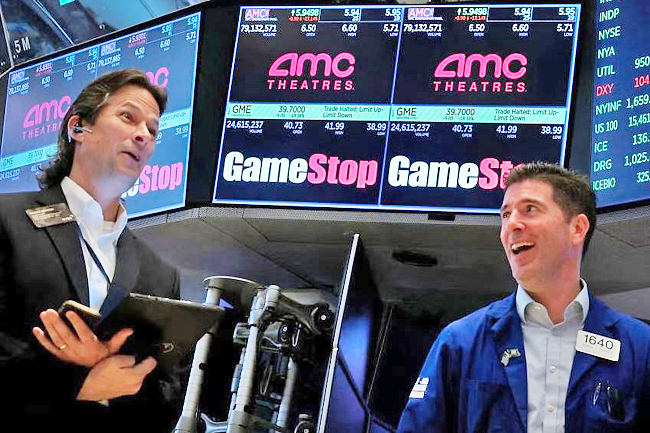ANN/THE STRAITS TIMES – You can add meme stocks to the list of things sending mixed signals about the economy as Wall Street traders and central bankers try to assess the health of United States (US) consumers.
The job market is cooling, credit card delinquencies are rising, and people have burned their excess COVID-19 pandemic savings as food and housing costs slam household budgets. And yet, all it takes is a cryptic tweet from a retail investing cult hero to send shares of GameStop and AMC Entertainment Holdings soaring, despite the lack of fundamental news.
This economic paradox highlights the challenge facing the US Federal Reserve as it tries to determine the right time to cut interest rates in the face of stubborn inflation. At first blush, this meme-stock boomlet showed retail investors flush with enough disposable income, not just to keep spending, but to gamble in the stock market like it is 2021.
Still, overall consumer sentiment has slumped and despite the S&P 500 touching record highs, there are plenty of data points showing signs of mounting stress. Not to mention, this meme rally fizzled quickly.
“Consumers have been generally downbeat,” said professor of finance at the University of Pennsylvania’s Wharton School Nikolai Roussanov. “On the other hand, we see this type of behaviour in financial markets that’s consistent with actually quite bullish sentiment.”

The recent trading frenzy started with a post on social media platform X from Roaring Kitty, the online nickname of Keith Gill, who rose to prominence in 2021 as he rallied traders on online social forum Reddit around the struggling video game retailer GameStop. On May 12, the account published a vague message that appeared to show a man sitting up in a chair with a gaming controller.
For traders on Reddit’s WallStreetBets forum, it was taken as a sign that Gill, who disappeared from social media in June 2021, would be coming back to action. That generated excitement around not just GameStop, but also AMC. However, this time, the rally was short-lived.
After surging 179 per cent over two trading days, GameStop shares have pared back the week’s advances to just 16 per cent after trading closed on May 17. AMC, meanwhile, was up about 54 per cent after gaining as much as 135 per cent.
Dustin Rudiger, a 31-year-old from San Jose, California, said he managed to get in and out before the plunge. He was on vacation in Japan when he noticed chatter on Reddit about Roaring Kitty and GameStop. He said he invested roughly USD25,000 in the stock and then quickly sold, profiting about USD10,000.
Rudiger posted about his gains on Reddit, but got a lot of blowback from others about the need to “hold on for dear life” (known online as “hodl”) or to have “diamond hands”, references from the 2021 meme-stock boom about staying put in risky assets for the long run.
“Ninety-nine per cent of them are not planning to do that. They’re planning to sell when it’s high, they just want everyone else to not sell,” Rudiger said. “They just want to make money, which we all do.”
A lot has changed in the more than three years since Gill and an army of Reddit traders, many stuck at home and flush with cash from stimulus payments, took Wall Street by storm. Now, higher interest rates and inflation have taken a bite out of budgets and fuelled a gloomy economic outlook for many average Americans. And, as at March, Americans households had “fully spent their pandemic-era savings”, according to a recent report from the Federal Reserve Bank of San Francisco.
Then there is the stock market. The S&P 500 has gained 11 per cent in 2024, withstanding the economic malaise percolating on Main Street.
One reason a strong stock market may not be translating into better consumer sentiment is the gap between who owns equities in America. The country’s top one per cent have USD20 trillion invested in equities, as opposed to the roughly USD400 billion owned by the entire bottom half, according to the Fed. Rising asset values make wealthier households feel comfortable spending, splurging, and even speculating. That effect gets missed down the income ladder.
Harvard Business School business administration professor Lauren Cohen said: “There isn’t ‘one economy’. We all experience different economies.”






